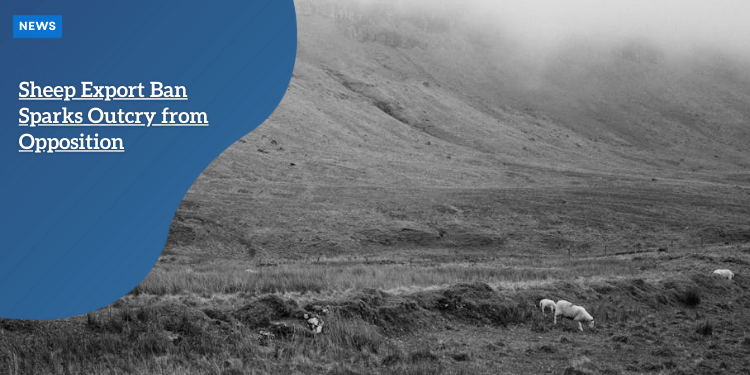Sheep Export Ban Sparks Outcry from Opposition

Anúncios
A controversial ban on the live export of sheep by sea has ignited a significant backlash, with opposition figures condemning the federal government for undermining the livelihoods of thousands of farmers.
On Thursday, the lower house witnessed the introduction of new laws that would bring an end to live sheep exports by sea, effective from May 2028.
However, live sheep exports would still be permissible via air transport, addressing ongoing animal welfare concerns.
The government has earmarked $107 million to support approximately 3,000 farmers in Western Australia who will be impacted by this industrial shutdown.
Anúncios
Federal Government’s Justification
Introducing the legislation, Infrastructure Minister Catherine King stated that a planned phase-out date would provide the industry with much-needed certainty, as opposed to imposing harsher immediate measures.
“This is the right thing to do for sheep welfare outcomes, but the government recognizes that it needs to be done in a manner that allows for an orderly transition,” she expressed.
Minister King elaborated on the expectations that phasing out live sheep exports would result in increased sheep meat processing within Australia.
This, she proclaimed, would lead to value addition, enhancing farm-gate returns, retaining jobs within the country, and facilitating regional development.
Her statements underscored the government’s commitment to balancing animal welfare considerations with economic repercussions.
Anúncios
Criticism from the Nationals
Nationals leader David Littleproud didn’t hold back in his criticism of the government.
“It’s important that when a government is about to make such a crucial decision, they show respect, not the contempt they have shown these men and women, who have lawfully gone about their business,” he articulated to parliament.
Littleproud accused the government of allowing ideology to rip away the livelihoods of farmers, highlighting the phase-out as a betrayal of trust.
During parliamentary deliberations, attempts by the Nationals to have the laws reviewed by a committee were unsuccessful.
Littleproud acknowledged the industry’s past mistakes but pointed to significant animal welfare reforms that have been adopted over time.
“We have managed to ensure that the animal welfare standards in countries that receive our sheep exports now mirror our own. But if we cut and run, that progress is lost,” he asserted.
Littleproud took pride in Australia’s leadership in imposing stringent animal welfare standards globally and expressed dismay at the government’s perceived abandonment of the industry.
Future Political Implications
The coalition has vowed to overturn the live export ban should they come into power in the next election, with Western Australian farmers poised to make it a significant electoral issue.
The opposition’s commitment underscores the political weight the issue carries, especially in regions heavily reliant on live sheep exports.
Labor’s commitment to ceasing live sheep exports was catalyzed by a tragic incident in 2017, wherein over 2,000 sheep succumbed to heat stress while en route from Australia to the Middle East.
The incident spurred intense scrutiny and renewed calls for reforms within the live export industry.
Legal and Economic Ramifications
Under the newly introduced laws, severe penalties would be imposed on those persisting with live sea exports, marking a tough stance on enforcement.
While live sheep exports are targeted, other live exports, such as cattle, would continue to be permitted by sea, highlighting the legislation’s specific focus on sheep welfare.
The government, cognizant of the economic repercussions, has allocated substantial funds to aid the transition for affected farmers.
The $107 million package is designed to provide economic relief and facilitate adaptation to new industry norms.
Yet, the opposition remains staunch in their belief that these measures fall short of addressing the long-term impacts on farmers’ livelihoods.
Broader Industry Perspective
Several industry stakeholders have weighed in on the debate, bringing to light diverse perspectives on the issue.
Proponents of the ban argue that the shift to increased domestic processing will not only improve animal welfare but also boost the domestic economy.
Critics, on the other hand, warn of unintended consequences, such as market destabilization and loss of traditional export markets.
The Australian Livestock Exporters’ Council has expressed concerns over the logistical and economic challenges posed by the transition.
“The live export industry has been a cornerstone of the rural economy, and any abrupt changes threaten to disrupt this delicate balance,” stated a spokesperson.
They stressed the need for a carefully managed transition, one that aligns with both animal welfare standards and economic sustainability.
Animal Welfare Considerations
Animal welfare organizations have long advocated for the end of live sheep exports by sea, citing repeated instances of cruelty and inhumane conditions.
The transition to air transport is seen as a compromise, providing a more controlled environment for the animals.
“This legislation marks a significant step forward in addressing the long-standing animal welfare issues associated with live exports,” commented a representative from the RSPCA.
The organization has voiced support for the phased approach, emphasizing the need for ongoing monitoring and enforcement.
The debate over live sheep exports is emblematic of broader societal questions about the ethical treatment of animals, economic livelihood, and the role of government in regulating industries.
As the transition unfolds, it will be crucial to balance these competing priorities to ensure a sustainable and humane outcome.
International Reactions
Internationally, the legislation has garnered mixed reactions.
Trading partners reliant on Australian live sheep exports have expressed concern about the potential impacts on their supply chains.
“We rely heavily on Australian sheep for our meat supply, and this ban could have significant ramifications,” mentioned a Middle Eastern trade representative.
Diplomatic negotiations may be necessary to navigate these international repercussions.
Conversely, animal welfare advocates worldwide have hailed the move as a leading example of ethical reform in agriculture.
Global organizations have called on other countries to follow suit, citing Australia’s leadership in advancing animal welfare standards.
Conclusion: The Path Forward
The introduction of legislation to ban live sheep exports by sea represents a pivotal moment in Australian agricultural policy.
As the debate intensifies, the government’s challenge will be to implement the phase-out in a manner that upholds both animal welfare and economic viability.
The opposition’s strong condemnation underscores the contentious nature of the issue, highlighting the deep divisions within the political landscape.
Ultimately, the success of this transition will depend on effective government support for affected farmers, sustained industry engagement, and robust enforcement of animal welfare standards.
The path forward will require a delicate balance of ethical considerations, economic impacts, and political realities.
Only time will reveal whether this controversial ban will achieve its intended outcomes without inflicting undue harm on Australia’s farming community.






